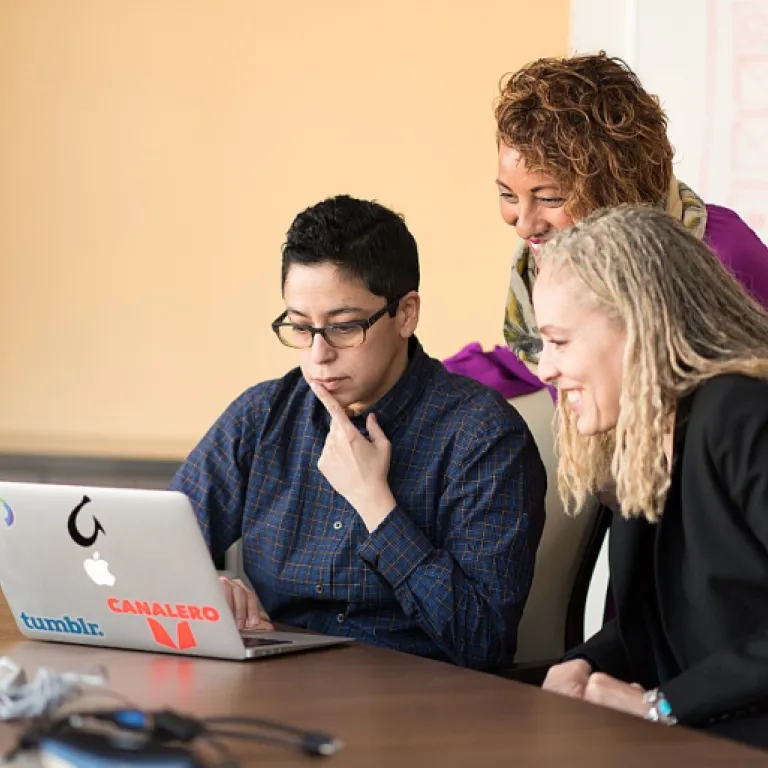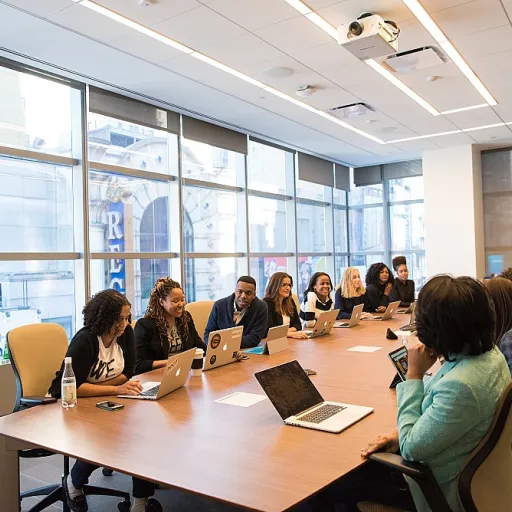
Understanding the Role of Group Coaching in Candidate Experience
Group Coaching: A Catalyst in Candidate Experience
In the evolving landscape of talent acquisition, companies are increasingly focusing on improving the candidate experience. Group coaching has emerged as a transformative approach to achieving this. But what exactly is the connection between these group coaching sessions and the candidate experience? Group coaching provides a structured, interactive learning experience. It not only addresses the professional development needs of participants but also aligns with the goals of enhancing the overall experience for job seekers. By engaging candidates in a group setting, organizations help clients foster a sense of community and shared learning, vital for networking and personal growth. One of the key differentiators of group coaching is the dynamic it creates. In a group session, candidates can share insights and challenges, offering a broader perspective than one-on-one coaching. The collaborative environment encourages participants to learn from each other's experiences, promoting a richer and more varied learning experience. For coaches, it is an opportunity to understand the diverse needs of a candidate group. As they tailor their coaching program to suit varied goals, they can foster more inclusive and effective group discussions. The coaching business also benefits from these group sessions by reaching a larger audience in a single time frame. Further, the implementation of such programs within businesses aligns with fostering emotional intelligence and interpersonal skills among candidates. As part of a team, candidates not only gain insights into the roles they aspire to but also prepare for future professional environments. To fully leverage these benefits, organizations need to develop and implement effective group coaching programs. By addressing the unique challenges of this approach and measuring its impact on candidate experience, companies can significantly enhance their overall talent acquisition strategy. As companies continue to refine their methods, exciting future trends in group coaching are likely to emerge, further revolutionizing the candidate experience. For those interested in exploring innovative ways to enhance candidate experiences, check out these creative methods.Benefits of Group Coaching for Job Seekers
Unlocking Opportunities for Job Seekers
Group coaching offers numerous benefits for job seekers aiming to enhance their candidate experience. Utilizing a coaching program tailored to career development can be a game-changer for individuals navigating competitive job markets.- Building a Supportive Network: The group setting fosters a sense of camaraderie among participants. Sharing experiences and challenges with others in similar situations creates a support network that extends beyond group sessions.
- Enhanced Learning Experience: Diverse perspectives enrich the learning process. Participants gain insights from both coaches and peers, facilitating a well-rounded understanding of different job-seeking strategies.
- Improved Communication Skills: Regular interactions within the coaching group encourage job seekers to refine their communication skills, critical for interviews and professional growth.
- Targeted Goal Setting: Coaches help clients set realistic and effective goals. In a group coaching setting, these goals are shared and discussed, offering motivation and accountability.
- Cost-Effective Solution: Compared to one-on-one coaching, group sessions are often more budget-friendly. This accessibility enables a wider range of participants to benefit from professional guidance.
- Boosted Confidence: Engaging in a community that understands and relates to one’s challenges can significantly boost one's confidence, essential for a positive candidate experience.
Driving Success with Focused Strategies
Effective group coaching programs are designed to address the unique needs of participants, focusing on the practical application of learned techniques. Coaches, adept in guiding diverse groups, tailor their coaching practice to achieve optimal outcomes, creating a dynamic and engaging learning environment. For businesses and organizations, implementing impactful coaching programs can significantly elevate the overall experience of job seekers. Investing in a comprehensive coaching strategy helps not just individuals but also strengthens team dynamics and organizational goals, ultimately supporting talent retention efforts.Moreover, the impact of employer branding on attracting and retaining talent can be further enhanced through effective group coaching. Organizations that prioritize supportive coaching programs underscore their commitment to employee development, thus creating a positive employer brand that appeals to prospective candidates.
Implementing Effective Group Coaching Programs
Building a Framework for Successful Group Coaching Programs
Implementing effective group coaching sessions begins with understanding the dynamics of the group setting. A group coaching program should be tailored to meet the unique needs of its participants while aligning with the overarching goals of the coaching practice. Here’s how to create a successful framework:- Define Clear Objectives: Start by identifying the specific goals you want the program to achieve. Whether it’s skill enhancement, boosting confidence, or expanding knowledge, clarity is key. Defining these goals will help both the coach and the participants measure progress effectively.
- Formulate a Structured Plan: A well-organized plan outlines the topics and activities for each session. This structure provides a roadmap for both coaches and clients, ensuring that time is utilized efficiently and objectives are met.
- Facilitate Interactive Learning Experiences: Encourage an engaging environment where participants can share ideas, experiences, and feedback. This could involve team exercises, discussions, and sharing sessions that allow learning from each other’s insights.
- Provide Resources and Support: Supplement coaching sessions with reading materials, online resources, or access to professional networks. This ongoing support helps clients apply what they learn and continue their development outside the group sessions.
- Create a Feedback Loop: Regularly seek feedback from participants to refine and enhance the program. Encourage open communication to understand the challenges and successes experienced by the group, allowing for adjustments to improve the learning experience.
Challenges in Group Coaching and How to Overcome Them
Overcoming Challenges in Group Coaching to Improve Candidate Experience
Group coaching programs present unique challenges, and it’s crucial for businesses and coaches to anticipate and effectively manage these issues to enhance candidate experience. When designed and executed well, group coaching can offer profound benefits, but several hurdles must be addressed to ensure success. Firstly, the management of diverse personalities and goals within a coaching group can pose a significant challenge. It's essential for coaches to foster an inclusive environment where every participant feels valued and heard. Encouraging open communication during coaching sessions can help in addressing individual differences, allowing each member to share their perspectives and learn from one another. Time management is another potential pitfall. Ensuring that every participant receives adequate attention within the set timeframe of a group coaching session can be difficult. Coaches must skillfully allocate time to cover essential topics while providing opportunities for interaction and personalized feedback. Conducting pre-session assessments can aid in determining each participant’s priority areas, allowing for a balanced distribution of time. From a logistical standpoint, the setup and coordination of online group coaching sessions can be challenging due to technical issues and varied participant locations. Adequate preparation is key — this includes testing the technology beforehand and having a backup plan in place to tackle unforeseen technical glitches. A seamless virtual experience instills confidence in participants and enhances their perception of the program's professionalism. Maintaining participant engagement over multiple sessions can also be daunting. To counteract this, coaches might incorporate interactive elements such as breakout sessions or real-world scenario discussions. These strategies not only maintain interest but also enrich the learning experience. Furthermore, setting clear, achievable goals for each session helps keep the participants focused and motivated. Lastly, measuring the success of group coaching against stated goals is crucial for refining future sessions. Gathering feedback from participants will provide valuable insights into areas for improvement. Incorporating this feedback into subsequent coaching programs demonstrates commitment to participant development, fostering trust and satisfaction among coaching clients. By thoroughly addressing these challenges, businesses can offer effective group coaching programs that create a positive, constructive experience for all participants.Measuring the Impact of Group Coaching on Candidate Experience
Assessing the Outcomes of Group Coaching Initiatives
Effectively measuring the impact of group coaching on candidate experience is essential for ensuring that the efforts invested yield tangible benefits. The key is to establish metrics that align with the objectives of each coaching program and to regularly review these metrics to determine the effectiveness of the coaching sessions.
- Feedback from Participants: One of the simplest yet most effective ways to gauge the impact of group coaching is through feedback from the participants. After each session, collecting insights from the learning experience can provide invaluable data on what is working and what needs improvement.
- Goal Achievement: Another essential aspect to consider is whether the goals set at the beginning of the program have been met. Building a structured approach where success is defined collaboratively with coaching clients can help to keep track of progress.
- Engagement Levels: The level of engagement in the coaching group is an indicator of how effective the sessions are. Monitoring participation and interaction during group sessions can provide a clearer picture of how the participants are benefiting.
- Long-term Success: It's crucial to follow up with participants down the road to assess the professional impact. This analysis can highlight where the coaching practice might be making a substantial difference and where there is still room for improvement.
Incorporating these metrics can help coaches and coaching businesses refine their approach, ensuring that the one coaching and team coaching efforts bring about a positive change in the candidate's journey.













